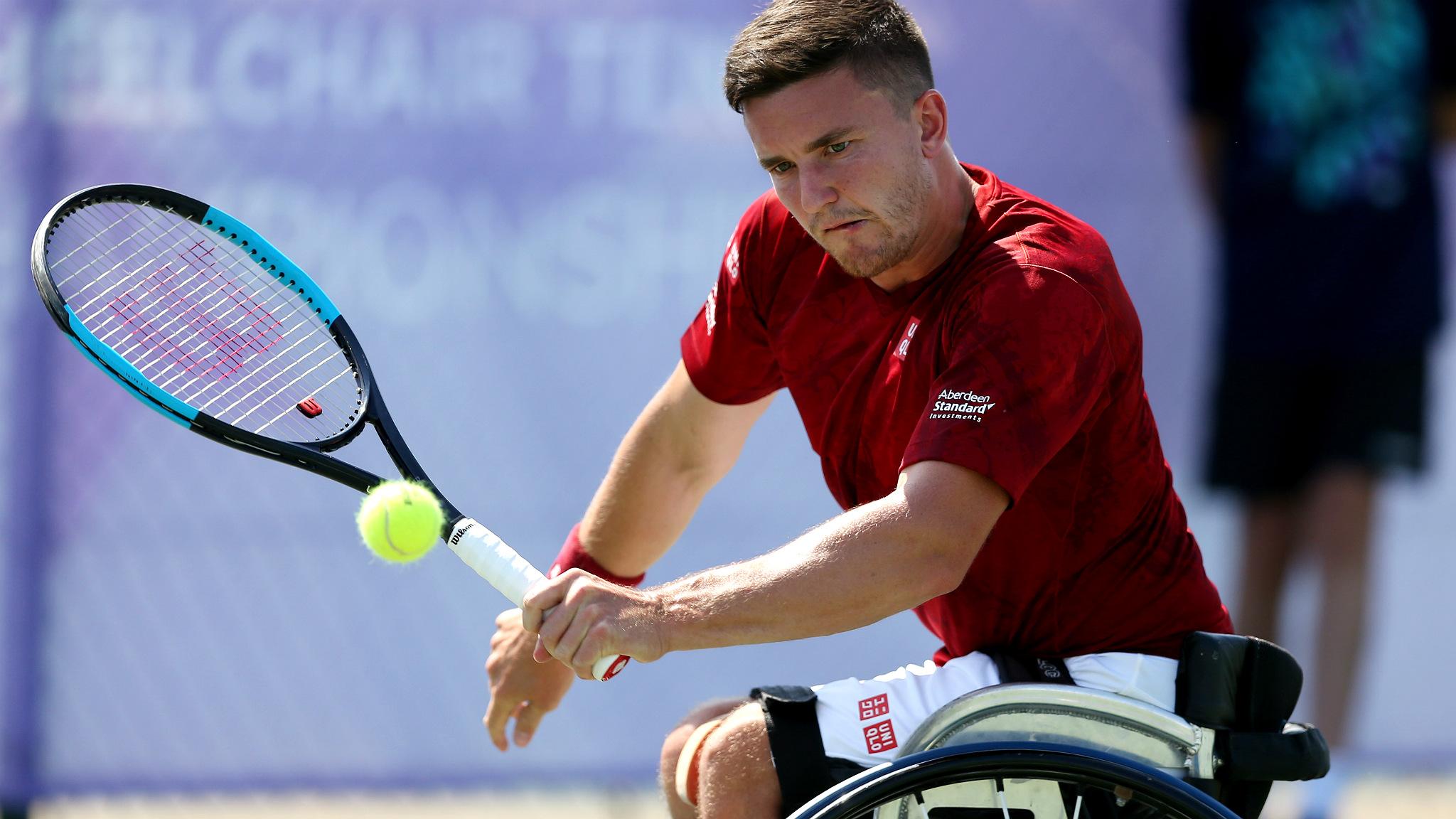Novak Djokovic: What impact will fatherhood have on his tennis?
- Published
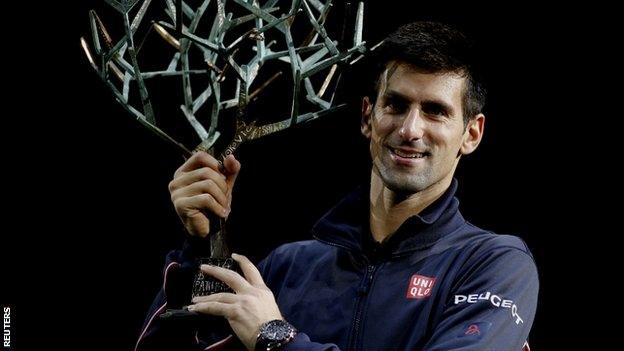
Novak Djokovic became the first man to win back-to-back titles at the Paris Masters
ATP World Tour Finals, O2 Arena London, 9-16 November |
Sunday: Murray v Nishikori on BBC Two and BBC Sport website at 14:00 GMT |
Coverage: Afternoon sessions (14:00 GMT) and first semi-final (14:00 GMT) on BBC Two/BBC Sport website, 5 live sports extra; final on BBC Three/BBC website (19:00 GMT); live text commentary on BBC Sport website, mobiles and app |
Novak Djokovic likes routine. He does not do disorder or chaos. He is the guy who checks the colour of his urine at the same time every morning to make sure he is not over or under-hydrated. (For the curious, he likes "a little bit of colour".)
He's wheat-free, dairy-free and perpetually pushing for self-improvement.
Late nights are not for Djokovic. The world's best tennis player gets seven to eight hours' sleep a night, practises meditation, yoga and tai chi, and hooks himself up to a machine that measures stress levels. When he has a spare moment in his day, he writes his thoughts in a diary.
If you're looking for anarchy or a little mayhem, a player who celebrates winning a Grand Slam by tucking into a single square of chocolate (his first bite of the sweet stuff for 18 months) is not your man.
But the life Djokovic knew, the one of habitual focus, has changed these past couple of weeks, since the seven-time Grand Slam champion's wife, Jelena, gave birth to the couple's first child.
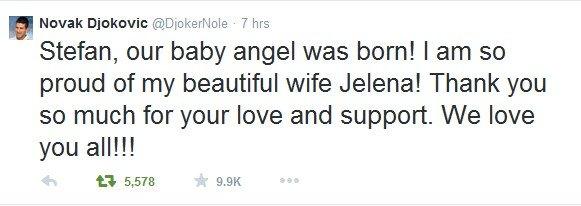
Novak Djokovic announces the birth of his baby son on Twitter on 22 October
Baby Stefan may have little regard for tennis tournaments and practice sessions, especially when all he wants to do is scream and grizzle and regurgitate his latest feed over dad's shoulder.
Can the world number one, still in his prime at 27, combine fatherhood with continued on-court success?
His performance at last week's Paris Masters, where the Serb became the first man to win back-to-back titles in the tournament's 46-year history, would suggest the answer is a resounding 'yes'.
On his first return to competitive action since becoming a father, Djokovic did not drop a set. He celebrated his sixth title of the season by sucking his thumb, and joyously revealed: "This is definitely the best time of my life."
For someone who is particularly particular, it is perhaps no surprise the Wimbledon champion has researched his new role, seeking out the advice of fellow dads competing in a sport which calls for long flights and lonely nights.
World number 28 Ivo Karlovic, father of three-year-old Jada Valentina, is one player who has spoken to Djokovic about the sacrifices and demands of parenthood.
"We just talked about what fatherhood is like," said the 35-year-old Croat., external "But he will have to learn for himself. Before, like everybody else who doesn't have a kid, he would have been a little bit selfish, but once you have a kid, that completely changes. From now on it'll be about the kid. It's no longer all about him."
Grand Slam-winning dads (since 1990) | |
|---|---|
Stanislas Wawrinka (2014 Australian Open) | Roger Federer (2010 Australia Open & 2012 Wimbledon) |
Andre Agassi (2003 Australian Open) | Albert Costa (2002 Roland Garros) |
Yevgeny Kafelnikov (1999 Australian Open) | Petr Korda (1998 Australian Open) |
Boris Becker (1996 Australian Open) | Andres Gomez (1990 Roland Garros) |
Ivan Lendl (1990 Australian Open) |
Since 1990, nine players have won Grand Slams as fathers. Roger Federer, the world number two, is the only dad to win two majors, while the Swiss maestro's compatriot Stan Wawrinka, father of a four-year-old girl, captured his maiden Slam at this year's Australian Open.
"There goes 1987," John McEnroe is claimed to have said when the three-time Wimbledon champion's then-wife, actress Tatum O'Neal, informed the American she was pregnant with their second child.
McEnroe's children would never see their dad hoisting aloft a Grand Slam trophy, the former world number one winning his last major title, at the US Open, as a 25-year-old single man.
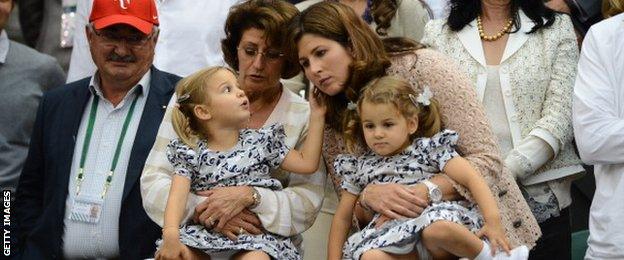
Roger Federer's wife, Mirka, and the couple's daughters, Myla and Charlene, watched their father compete at Wimbledon this year
Djokovic is likely to use 33-year-old father-of-four Federer as a role model. A man who has proved that paternity is not the beginning of the end for a top-ranked player's ambitions.
Six months after the birth of his identical twin daughters Myla and Charlene, the 17-time Grand Slam champion won the 2010 Australian Open. Two years later, he secured a record-equalling seventh Wimbledon title.
Federer was back in work six days after the birth of his twin boys, Leon and Lenny, this summer and the greatest of the greats is enjoying a renaissance of late.
He is challenging Djokovic for the year-end number one ranking, attained his first Shanghai Masters title in October and, later this month, could lead Switzerland to success in the Davis Cup final, the only jewel missing in his crown.
Fatherhood, says Federer, has had a "very positive change" on his life. But not many sporting dads are worth an estimated £140m - earning £32m a year in endorsements alone , external- and travel on private planes, with nannies, coaches and physiotherapists easing the burden.
Djokovic could also bankroll a well-organised entourage. The four-time Australian Open champion, who also travels to tournaments on a private jet, has earned £41m ($66m) in prize money alone and is 17th in Forbes' 2014 list of the world's highest-paid athletes.
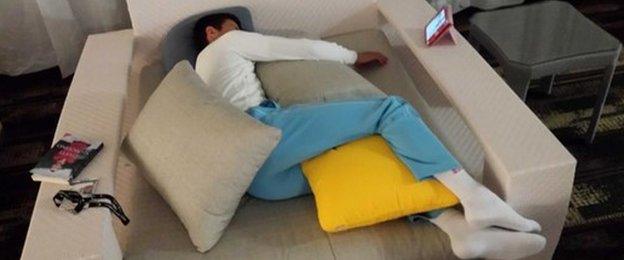
Novak Djokovic may find himself making the most of opportunities to sleep
But domestic bliss does not come easily for those earning a living on the Tour. Karlovic, whose lifestyle is not as opulent as his two more illustrious fellow pros, was unable to conquer the difficulties of travelling with a baby.
His wife, Alsi, and daughter stay at home in Miami while he competes, leaving the 2005 Queen's Club finalist, external relying on Skype to help ease the longing for home.
"It's difficult when the children are babies," he explains. "It's not easy travelling in aeroplanes all the time, changing time zones and living in hotels. Jada Valentina hasn't travelled a lot with me in the last few years, but when she's ready, they will join me on Tour."
Even if the constant travelling proves to be problem free, there is the prospect of sleepless nights; tweaking long-established training regimes to suit a man in a sleep-deprived trance.
"There was a lot of crying," recalls Karlovic of living with a newborn. "But after six months it became better. I was lucky because I would get a good night's sleep on the Tour.
"In the beginning, I wasn't sleeping well so in the morning I wasn't able to wake up so early. I used to practise in the morning, but we switched to the afternoons. The coach understood so it was always ok."
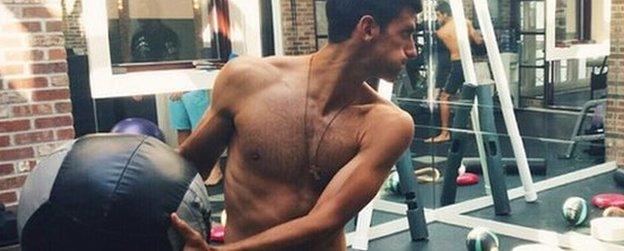
Djokovic is devoted to a punishing physical training programme
Federer's wife Mirka, a former player, is said to run domestic affairs with military precision and father of twins Nenad Zimonjic, ranked three in the world in doubles, believes a supportive partner is essential for a harmonious work-life balance.
"My wife took care of most things and was happy to travel with the kids, which made it easier to concentrate on tennis," says the 38-year-old.
"We would stay in apartments or a hotel with adjoining rooms so it didn't affect my business, which is to play tennis.
"You never know how long you're going to stay in a tournament, that's the problem when you're travelling with a family, so you play in tournaments you know you have a chance of staying in for a while."
While tennis tournaments may not be the toddler's pink paradise that is Peppa Pig World, they are not hostile environments for families. Many, especially in America, provide play areas and organised day trips to the zoo for players' children.
"It is common to see kids playing with each other," says Karlovic, who describes the prospect of his daughter joining the tennis brood as a "delight".
"It will be life-changing for Novak, but it's one of the best things in life. He must enjoy it, it will be a lot of fun."
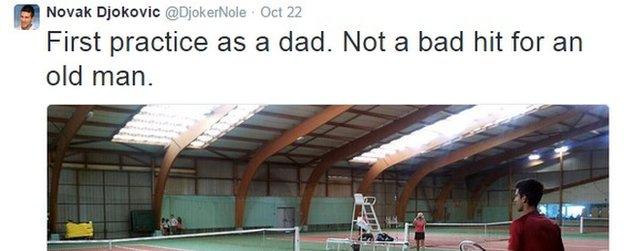
Djokovic has yet to lose a match since becoming a father to baby Stefan
Even for someone as Zen-like as Djokovic - a Belgrade boy who lived through two wars, using tennis as a refuge while his city was bombed for 78 consecutive nights - there is the expectation that becoming a father will help him gain greater perspective.
"I became a different person," says Karlovic. "If I lose or if I win, it isn't the most important thing in life anymore. It's all about my daughter, so if I lose a match I will not be devastated - it's only one moment in my life."
Zimonjic talks of being "more relaxed" on the court and enjoyed the most successful year of his career following the birth of his son and daughter in 2008.
"It's difficult when you leave the house and they're grabbing you, asking you not to go, but you try to make the most of the time you have with them and technology, like Skype, makes life easier," says the Serb.
Fathers in the ATP Top 50 | |
|---|---|
Novak Djokovic (Serbia) (1) | Roger Federer (Switzerland) (2) |
Stan Wawrinka (Switzerland) (4) | Gilles Simon (France) (21) |
Ivo Karlovic (Croatia) (28) | Pablo Cuevas (Uruguay) (35) |
Benjamin Becker (Germany) (40) | Gilles Muller (Luxembourg) (46) |
Mikhail Youzhny (Russia) (47) | Lleyton Hewitt (Australia) (49) |
Djokovic's coach Boris Becker, who did win a Grand Slam in 1996 after becoming a father, also believes it will have a positive affect on his player.
"It changed me for the better," Becker has said. "It changed Federer for the better and gave him a new zest for life.
"A tennis player's life is sometimes very lonely but to have your wife and kid with you sometimes gives you a better quality of life.
"It gave me three or four years on my career and I think it will do the same for Novak."
- Published7 November 2014
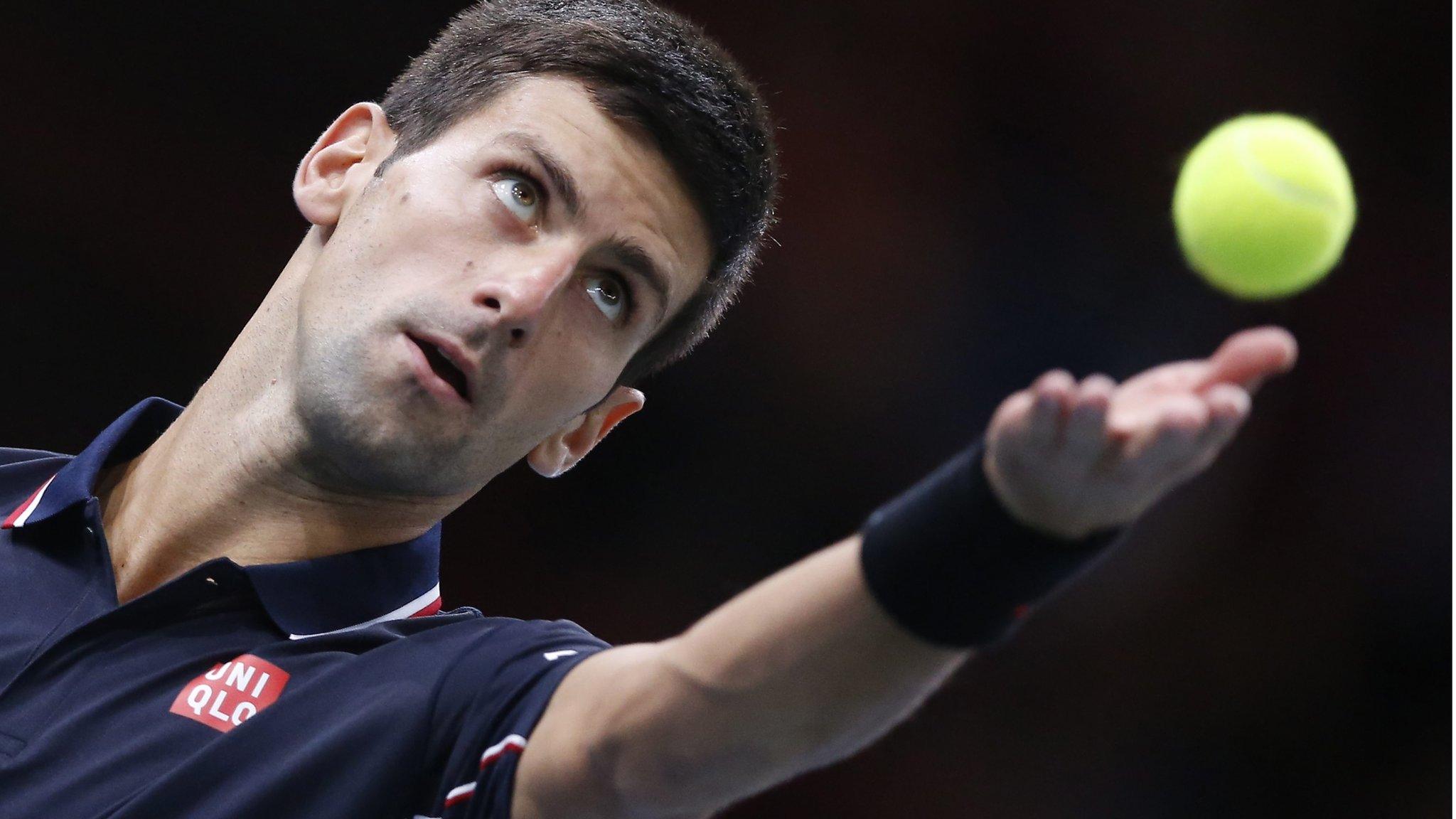
- Published2 November 2014
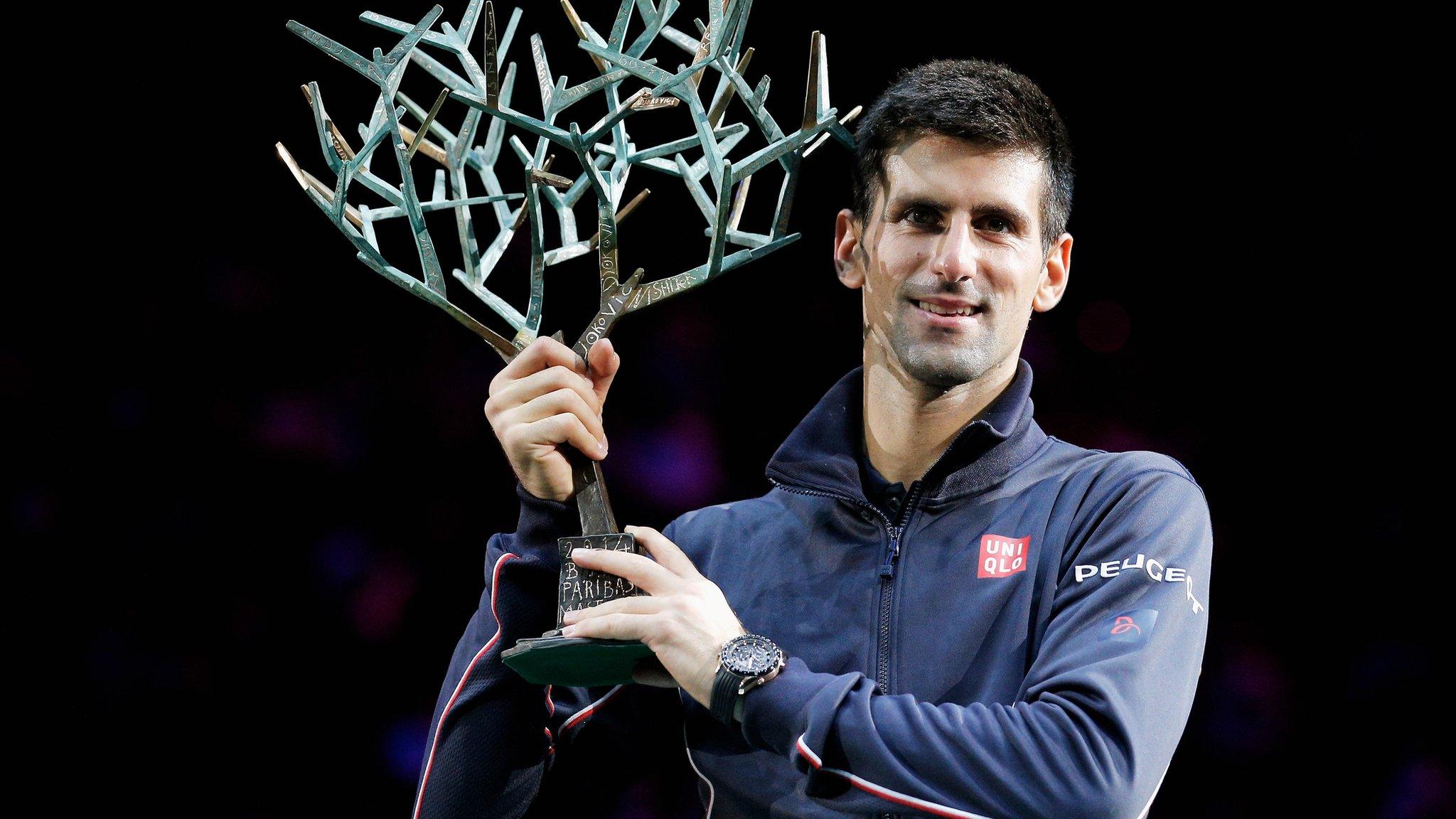
- Published27 October 2014
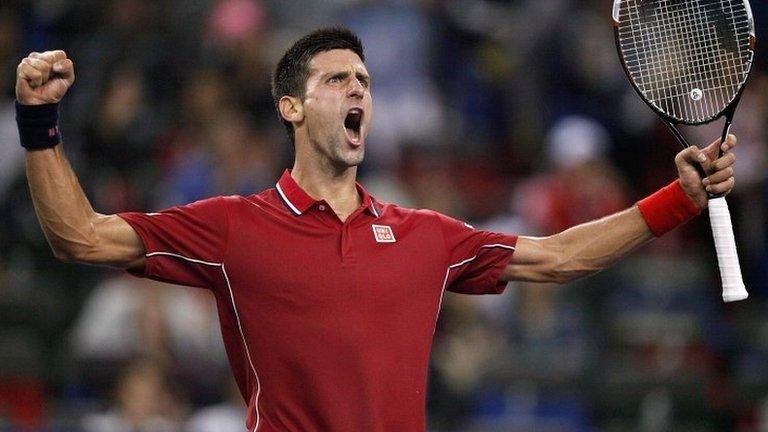
- Published3 November 2014
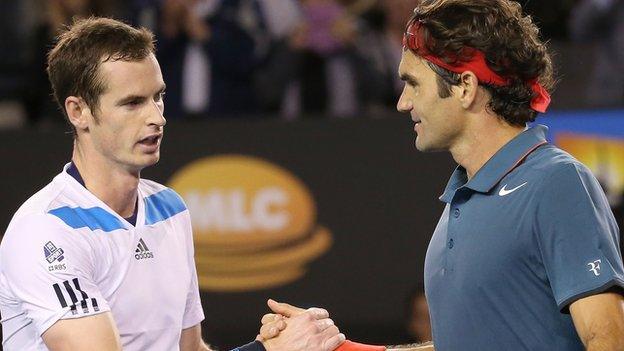
- Published12 October 2014
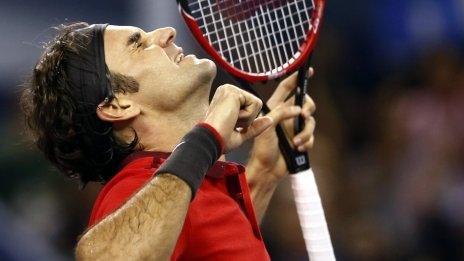
- Published6 July 2014
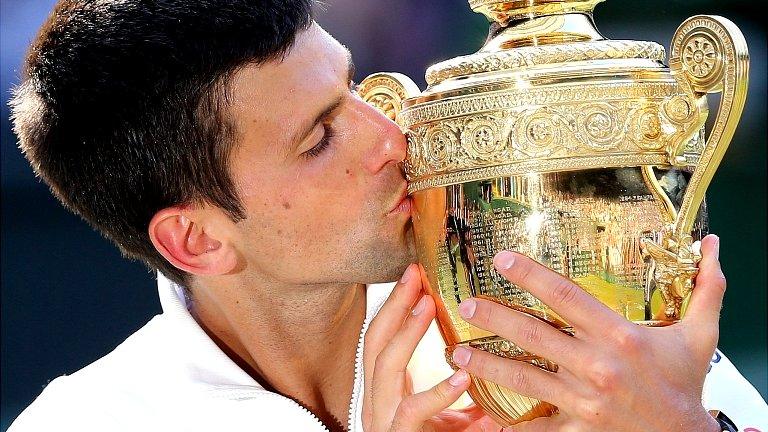
- Published17 June 2019
